The beginning of the Russian-Japanese war. Part of 2. Preparing Russia for war
The war with Japan was apparently one of the most predictable stories. The Japanese armed forces held their final rehearsal during the Sino-Japanese War of 1894-1895. The Japanese struck a sudden blow to China, the Chinese the fleet. The Japanese army landed in the Korean port of Chemulpo, where it was the most convenient place for landing. The Japanese will land there in 1904.
8 March 1900, Vice-Admiral Stepan Osipovich Makarov, handed over to the Main Marine Headquarters a note “Opinion on the organization of Port Arthur”. In it, he noted the inadequate land defense of Port Arthur, which could lead to dire consequences. Thus, the defense of the fortress required at least 447 guns, and only 200 guns were assigned. Makarov also noted the fact that the Japanese first of all would occupy the Korean Peninsula, and the Russian fleet, torn from its bases, would not be able to prevent their landing. Then the Japanese army will move to the Kwantung Peninsula and will be able to quickly concentrate more forces there than ours. As a result, it will be a war for the possession of Port Arthur. Port Arthur will become a symbol of the Russian-Japanese war. The fall of Port Arthur will deal a terrible blow to the position of Russia in the Far East. Thus, the Russian admiral almost completely predicted the entire course of a future war.
However, in the pre-war period in the Russian society in relation to Japan, there were widespread “capsitive” sentiments. Admiral Pavel Tyrtov, the manager of the Marine Ministry, imposed a long resolution on Makarov’s note, where he accused Makarov of alarmism.
In August 1903, the war minister, Aleksey Nikolayevich Kuropatkin, in a report to the emperor reported that the fortification of Port Arthur is at the final stage and with sufficient garrison and reserves it will be inaccessible from land and sea. The garrison of the Kwantung Peninsula is sufficiently strengthened, an annual reserve has been created. “Now we can not worry that even if most, for example, of the Japanese army, will collapse on Port Arthur. We have the strength and means to defend Port Arthur, even fighting alone against 5-10 enemies ... ”Later, a safe haven was created for the entire Pacific squadron. The squadron can "calmly" measure its strength with the entire Japanese fleet. As a result, Port Arthur, secured from the sea and land, having a strong garrison and supported from the sea by a powerful fleet, is an independent force. The stock in Port Arthur is enough to wait for the moment when our troops in Manchuria will be able to gather their strength and defeat the Japanese army, freeing Port Arthur, considered Kuropatkin. Now you can “not be worried” about the isolation of Port Arthur from Russia and the Amur region, and even reduce the costs of defense of the Far East. As we can see, Kuropatkin was greatly mistaken in his calculations. Makarov's assessment was much closer to the real picture.
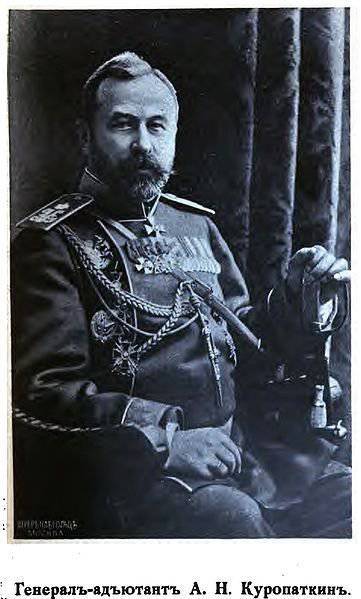
Alexey Nikolaevich Kuropatkin (1848 — 1925). In 1898 — 1904 - Minister of War. From 7 February 1904 - Manchurian Army Commander, from October 13 1904 - Commander-in-Chief of all land and naval armed forces operating against Japan
5 in November 1903, Chief of the Provisional Military Headquarters of the Governor of the Far East, Major General V. Ye. Flug, delivered a report to Viceroy Alekseev, where the Japanese offensive scenarios were marked. Japan could:
1) limit the seizure of the Korean Peninsula;
2) after seizing Korea and creating bases there, direct the main attack on the Russian troops in South Manchuria and Port Arthur;
3) deliver the main blow to Vladivostok and the South Ussuri region.
At the same time, the Japanese armed forces could conduct an auxiliary operation to seize Sakhalin and the mouth of the Amur. It was also noted that for the war with Russia, Japan could transfer 10 divisions to the mainland in the first half of the second month: 130 battalions, 46 squadrons, 576 guns (in reality, Japan could put up 13 divisions and 13 reserve brigades, more than 1 thousand guns). Against these forces, Russia could put up (except for the garrisons of the fortresses) 77 battalions, 75 squadrons and hundreds and 184 guns of troops of the Far East, which could be concentrated not earlier than the beginning of the third month. Thus, in the first period of the campaign, the Japanese army gained an advantage. Only by pulling up reinforcements from Western Siberia and European Russia, which could have been done not earlier than the seventh month of the war, could Russia concentrate a superior force.
It was obvious that the Japanese were unlikely to sit in Korea, giving Russia the opportunity to calmly concentrate superior forces and go on the offensive. Only with a vigorous offensive in the first period of the war could Japan have won up over the weaker, not completed concentration of Russian troops. From this report it was clear that if we quickly didn’t significantly strengthen our forces in the Far East, the first period of the war would end badly for Russia. The Japanese generals were not idiots and were not going to sit quietly in Korea for 6-8 for months, while the Russians moved troops from the European part of Russia.
In the report, Flug gave the erroneous conclusion of the Chief of the Provisional Naval Staff that "with the present balance of forces between our and the Japanese fleets, the possibility of defeating our fleet was not allowed." Therefore, it was believed that the Japanese would not be able to land in the West Korean Gulf or Yingkou (modern Chinese province of Liaoning). Rear Admiral Wilhelm Karlovich Vitgeft believed that the Japanese would be able to land on the western coast of the Korean Peninsula no closer than Jinampo (Tsinampo), or on the southeast and eastern coast of the peninsula.
The “supreme commander in chief”, Emperor Nicholas II, also had a scornful and scornful attitude toward Japan. The head of Russia treated the situation in the Far East lightly, calling the Japanese "macaques". The emperor declared that Japan had no real army, and in the event of the outbreak of war, the Japanese would easily be defeated. The public supported such “patriotic” moods. As a result, while the Japanese were rapidly pursuing the militarization of the country, they rallied the nation into a single fist, created a military-industrial complex, organized the army and navy according to advanced Western European standards, bought the latest squadron battleships and cruisers, in Russia military preparations were sluggish and indecisive. Opponent strongly underestimated.
Preparing Russia for war
In response to the strengthening of the Western powers in the Asia-Pacific region, especially Britain, Russia began to strengthen its forces in the Far East as early as the 1880s. Petersburg had an enormous amount of time to prepare the Russian Far Eastern frontiers for war. By the beginning of the Sino-Japanese War, Russian forces in the Far East had been increased to 30,5 thousand men and 74 guns. However, a significant part of the troops was the Cossack cavalry.
On the eve of Russia's intervention in the relations of Japan and China, the border districts strengthened with artillery. The Amur Governor-General Dukhovsky received instructions to strengthen local connections and strengthen Vladivostok, Nikolaevsk and the defense of Sakhalin. However, military activities were carried out slowly. First of all, this was due to the fact that the main attention of Russia was focused on the western direction, fixed assets and forces were used to strengthen military power in the European part of Russia, the eastern direction was financed according to the residual principle, it was long considered secondary, if not tertiary. Therefore, by the year 1898 in the Far East, the number of troops reached only about 60 thousand people with 126 guns.
Lack of funds, low population density, lack of roads, the embryonic state of the engineering preparation of the theater of war, the lack of barracks and the general underdevelopment of the military infrastructure of the region delayed the concentration of forces in the Far East. Japan at that time was accelerating the pace of military development, trying to prepare for war before the Russians completed the construction of the Circum-Baikal Railway.
In the 1898 year, when Russia occupied Port Arthur and the relations between the two powers became even more aggravated, a new military construction plan was adopted, which provided for bringing the number of Russian troops in the Far East to 90 thousand people and 184 guns. Russia's participation in military intervention against China, caused by the rebellion of boxers in 1900-1901, led to the transfer of troops from European Russia, the formation of a number of new units. The tense situation in the Far East demanded more attention from St. Petersburg and the governor Alekseev was ordered “to put our combat readiness in the Far East in complete balance with our political and economic objectives in the shortest time and without stopping for necessary expenses.” In accordance with this instruction, it was planned to form two new army corps with a total number of at least 50 thousand soldiers. These corps were to concentrate in the areas of possible landing of the Japanese troops. Strengthening of the army grouping in the Far East was carried out not by sending new units from the European part of Russia, but by re-forming local formations with the inclusion of separate groups of soldiers sent from European Russia.
It was decided to transfer two divisions and one brigade to Kvantunsky Peninsula, and also to strengthen Port Arthur and Vladivostok. Port Arthur received a garrison and a serf artillery. In 1903, two infantry brigades with artillery were transferred to the Far East. The garrison on Sakhalin was also fortified. The cavalry was not transferred to the Far East, they believed that more was needed in the European theater of military operations. In Manchuria, it was decided to limit the Cossack cavalry, concentrated in the border areas.
By the beginning of the war, Russia had in the Far East about 98 thousand soldiers and 272 field artillery guns (there were about 125-150 thousand people in total to the east of Baikal). The Port Arthur garrison numbered 22,5 thousand people, in Manchuria there were about 28 thousand people, in the area of Vladivostok about 45 thousand people. A few thousand more consisted of artillery, engineering and other compounds. In addition, there was still a guard of the CER (railway troops) - about 35 thousand people. Transsib to the beginning of the war acted, but its capacity was low 3 — 4 pairs of trains per day. It took about 1 a month to transfer one army corps from European Russia.
In addition, although Russia had good relations with China, part of the troops needed to be kept on the right flank to the detriment of the grouping in the most important eastern sector of the theater of operations. China was decentralized and provincial governors, local generals did not always obey the center, pursued their policies. Some of them could easily cooperate with Japan. Behind the Pechili border stood the troops of the Chinese generals Yuan Shih-kai and Ma.
The war found the Russian army in a state of reshaping: the two-battalion regiments were deployed into three-battalions, the brigades were transformed into divisions. Engineering training of the Far Eastern theater of operations also went slowly. The question of the development of military infrastructure was raised only when the inevitability of war became obvious to almost everyone. The focus was on strengthening Port Arthur and Vladivostok. In addition, some work was carried out on possible operational lines of attack by the Japanese army. The isolated position of Port Arthur required its powerful fortification, so that the garrison could hold out for quite a long time before the Russian army could deploy a counterattack.
The initial design of the fortifications of Port Arthur of the first stage provided for a two-year construction period. However, various circumstances, such as the Chinese uprising, when workers simply fled, cholera epidemics, the remoteness of Port Arthur, and simply theft, slowed down the work. Construction work was slow. Since 1903, work has proceeded at a faster pace, but time has already been lost, the construction program of the port-arthur fortifications was not fully implemented. They did not even have time to implement the fortification program on the Jinzhou Isthmus (the small town of Jinzhou was located not far from the narrowest point of the Liaodong Peninsula, the most convenient place for the defense of the peninsula). The fortifications of Vladivostok were also not completed. The city could only repel the first attacks.
Port Arthur. General form. Photo from Niva magazine 1904 of the year
Thus, Russia, unlike the Japanese Empire, was not ready for war in the Far East. The strengthening of Port Arthur and the Liaodonsky Peninsula, other fortifications were not completed, the railway did not allow to quickly transfer troops from the European part of Russia. In the Far East, a sufficient army grouping capable of confronting the Japanese army in Manchuria and Korea or even taking up the Korean Peninsula, part of the coast of China and preventing the landing of Japanese forces, was not concentrated in advance.
Did not have time to strengthen the 1-th Pacific Squadron. Rear Admiral Andrei Virenius detachment in 1903 left Kronstadt to the Far East, but with the start of the Russian-Japanese war it had to be returned from the Red Sea to Russia. The detachment could significantly strengthen the 1-th Pacific Squadron. It consisted of: Oslyabya squadron battleship, Dmitry Donskoy and Aurora 1 cruiser Almaz, cruiser 2, Frenzy, Brilliant, Quick, Cruiser, Impeccable ”,“ Poor ”,“ Vigorous ”and“ Bravy ”, four destroyers, three steamers of the Volunteer fleet“ Orel ”,“ Smolensk ”and“ Saratov ”. The Volunteer Fleet steamers could be used as auxiliary cruisers for operations on enemy communications. It should be noted that, if desired, Petersburg could send a large part of the Baltic Fleet to the Far East before the war. Later, the 2 Pacific Squadron was sent, but the decision was belated and led to a catastrophe.
The political situation for the start of the war was also unfavorable. The British Empire openly supported Japan. Full diplomatic, financial, military and material assistance to the Japanese was also provided by the United States. France, the official ally of Russia, took a cold neutral position. St. Petersburg had to look at the position of future allies on the Entente during the Russian-Japanese war and break the alliance with France in order to avoid participation in the First World War as the "cannon fodder" of London and Paris.
Germany was friendly towards Russia at that time, it was beneficial for Russia to get bogged down in Eastern affairs and distract from Europe. True, this did not prevent the Germans from selling Japan weapon and other products, business is business.
The battleship Oslabya leaves Bizerte, December 27 1903.
State of the Russian army
Russian army in the second half of the XIX - early XX centuries. was in crisis, which convincingly confirmed the course of the Eastern war (Crimea), the Russian-Turkish war 1877-1878, the Russian-Japanese war and the First World War.
Claims to the Russian soldier was not. Russian warriors, as in previous times, showed courage and dedication. During the Russian-Japanese war, Russian soldiers and sailors showed exceptional heroism and resilience, which was repeatedly noted by foreign military agents stationed at the headquarters of the Russian and Japanese armies. The Russian noncommissioned officer corps was well prepared. A good level of training was shown by lower and middle level officers.
The main problem was in the top command. The royal generals, with some exceptions, turned out to be completely incapable of displaying creative initiative. The peculiarity of the Russian (and then the Soviet, which confirmed the initial stage of the Great Patriotic War) military education was the overload of theory and the lack of practice. Academic education suppressed common sense. Instead, practitioners brought up doctrinaires who were not able to understand and accept the innovations in military affairs. Conscious, not afraid initiative was suppressed. Future generals, in fact, were not taught to fight. Many of the generals held top commanding positions not so much in skills and merit as in their high birth, connections in high society, the ability to please their superiors. They viewed service not as a service to the Motherland and the people, but as a source of wealth and honors. Such "commanders" did not enjoy prestige in the army. These were the generals of the “peace army”, incapable of innovation, initiative and decisive action.
The Russo-Japanese War fully confirmed the unsuitability of the generals. Partridge accused his generals in disrupting a number of operations. Thus, General Bilderling, during the battle of Liaoyan, having at his disposal considerable forces, did not stop the bypass movement of the Kuroki army. General Stakelberg Kuropatkin blamed for the extreme indecision of actions during the September offensive, as a result of a well-conceived operation failed. General Kaulbars failed the Mukden operation. Despite repeated orders and numerous reinforcements sent to him, he stubbornly did not go on the offensive and presented the enemy with two days.
It is high time that the generals began to serve as soldiers, like Suvorov. When Peter's practice worked, the Russian army was invincible. However, the system broke. As a result, the generals were filled with sycophants, opportunists, careerists, servants who know how to "serve beautifully" in peacetime. The highest positions flooded sons, relatives of generals and aristocrats who did not smell powder. The degeneracy of the "elite" of the Russian Empire fully affected the generals. Suffice it to recall the illegitimate son of Emperor Alexander II, "General-Admiral" Evgeny Alekseev, who was a participant in the so-called. Bezobrazskoy clique, as the chief of the Kwantung Oblast and the imperial governor in the Far East, more than anyone else, contributed to Russia's involvement in the confrontation with Japan. At the beginning of the war, Alekseev was appointed commander-in-chief of all land and sea forces in the Far East and was responsible for the failure of the initial period of the war.
Operational art was based on the doctrine of General Leer, which was based on the military art of the Napoleonic wars. According to the concept of Leer there were "eternal and immutable" principles of the art of war. The military art of the era of the German reunification wars was not well studied. Only in 1907, at the direction of the Chief of the General Staff Palitsyn, did the Academy of the General Staff begin to study the features of the military art of the 1866 and 1870-1871 wars. Thus, Clausewitz’s dialectic was not at all reflected by Leer. In addition to the tenets of Napoleon's art among the higher command personnel of the Russian imperial army, defense tendencies played a large role, which were combined with recognition of the profitability of concentration for action in internal operational areas. The generals, with the exception of a few exceptions, did not study the experience of the Anglo-Boer War and the last Sino-Japanese War, which became a rehearsal of the Russo-Japanese War for the Japanese Empire.
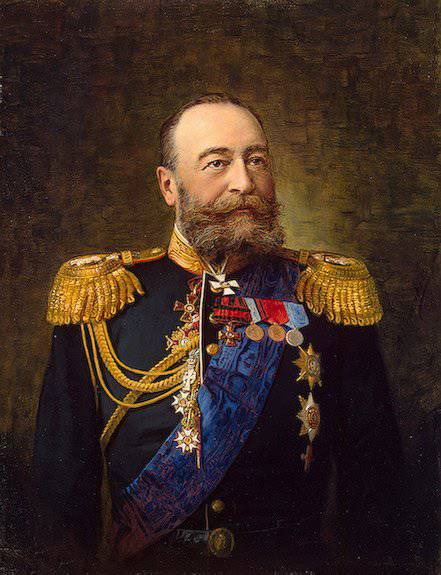
Evgeny Ivanovich Alekseev ((1843 — 1917). From 1899 onwards, the Chief and Commander of the troops of the Kwantung Oblast and the naval forces of the Pacific Ocean. From 1903 onwards, he was appointed deputy head of All Imperial Majesty in the Far East. land and sea forces in the Far East.
To be continued ...
- Alexander Samsonov
- The beginning of the Russian-Japanese war. The armed forces of the Japanese Empire
The beginning of the Russian-Japanese war. Part of 2. Preparing Russia for war
The beginning of the Russian-Japanese war. Part of 3. Russian army at the turn of the XX century. Theater of war
The beginning of the Russian-Japanese war. Part of 4. Plans of the Russian and Japanese command
The beginning of the Russian-Japanese war. Part of 5. Attack on port arthur
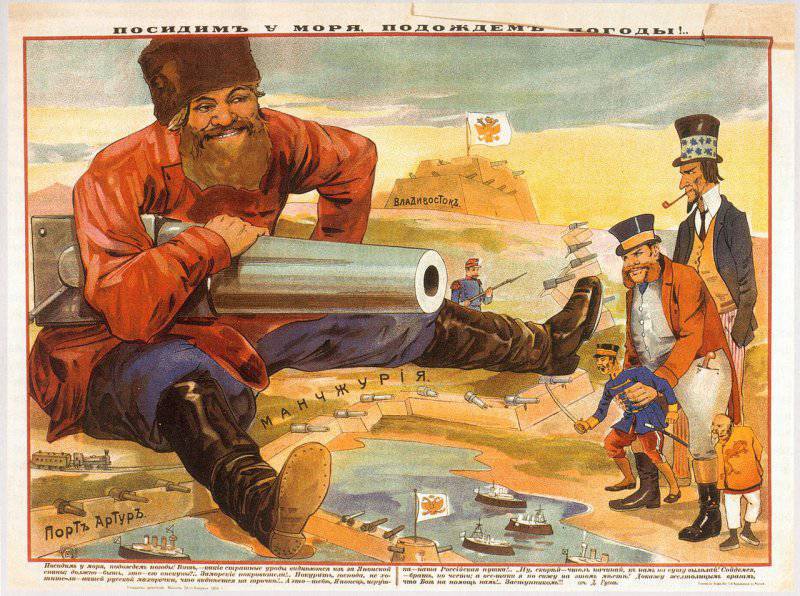
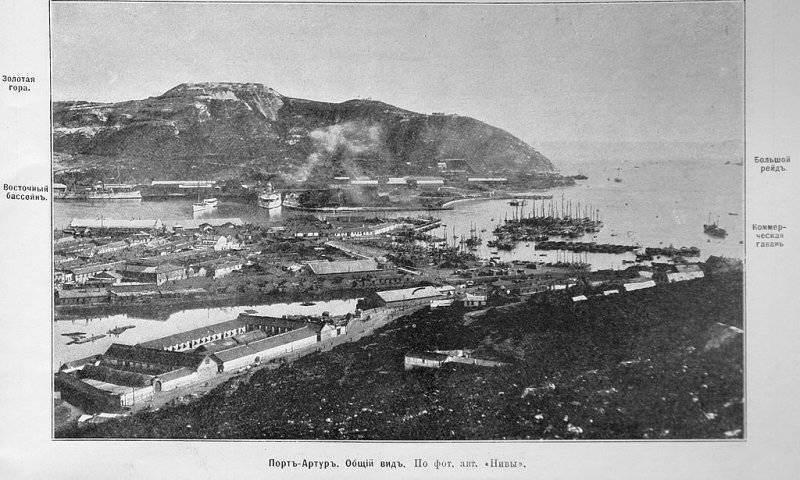
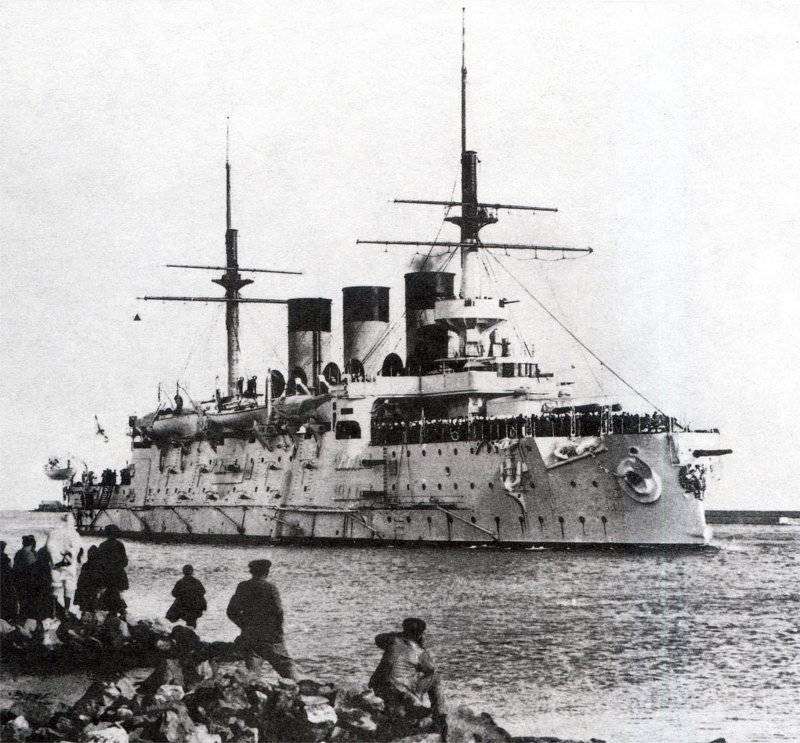
Information